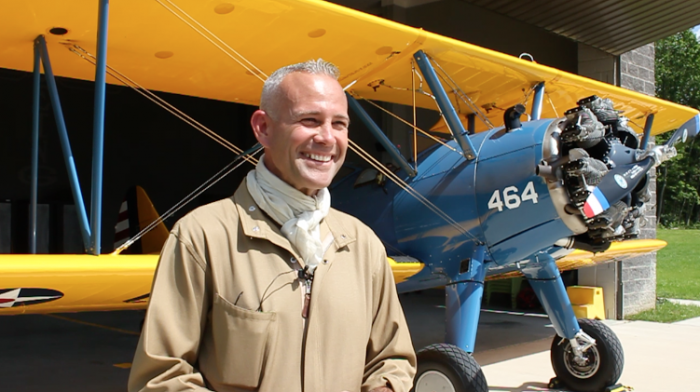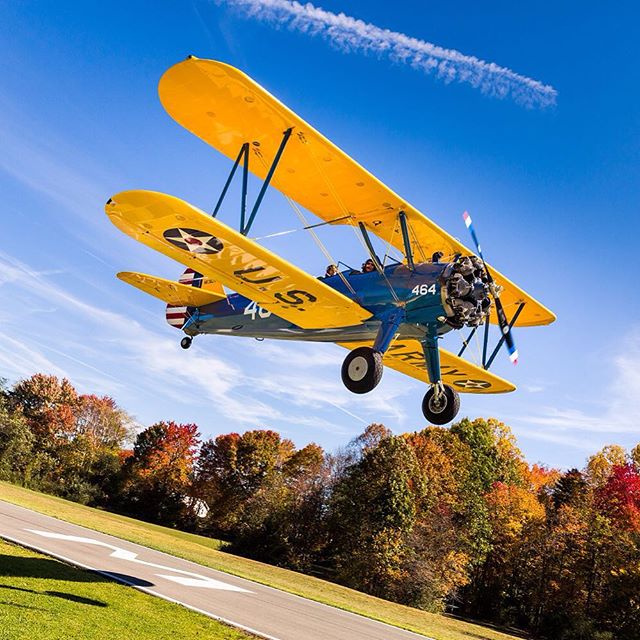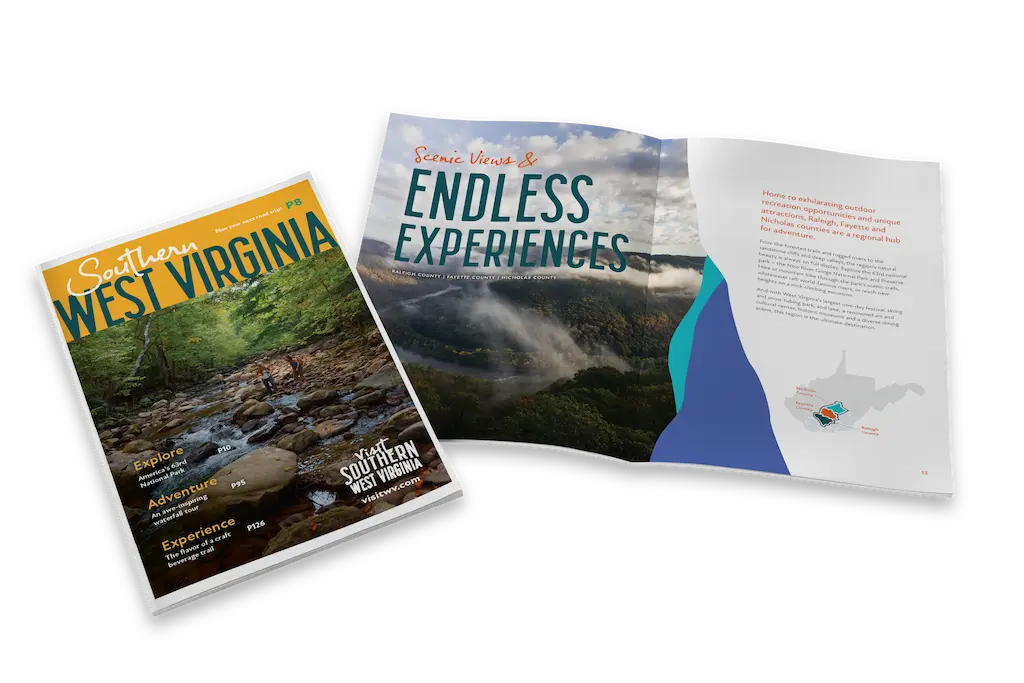In this little slice of the sky, it’s still WWII
April 25, 2016In his living room flanked by a black antique phone and a spread of World War II magazines atop a vintage trunk, 46-year-old Chris Kappler shares a vivid memory from boyhood.
His eyes overflow with childlike fascination as he speaks of visiting a great aunt in Columbia, Calif., a historic gold rush town he remembers smelling of “sarsaparilla and gun smoke.” Every year, his aunt would buy him a shotgun seat on the stagecoach ride. He’d sit alongside a mustached driver decked out from head to toe in Western attire— hat, scarf, boots, gun. He recalls the way his heart pounded when they were held up by “real rough guys they probably picked up at bars.” But he truly believed they were bandits.
 Fast forward a couple decades, and he’s back in that same old Western town, this time with kids of his own. His eyes fill with magic and anticipation as he hears the clop-clop-clop of the stage coach approaching. He just knows his kids are going to love it.
Fast forward a couple decades, and he’s back in that same old Western town, this time with kids of his own. His eyes fill with magic and anticipation as he hears the clop-clop-clop of the stage coach approaching. He just knows his kids are going to love it.
That anticipation quickly turned to disappointment. The driver had long since traded in his Western ensemble for a polo, a pair of Levi’s 501s and a baseball cap. One bandit donned a Sonora High School tee, and the other, a Skoal cap. They giggled as they held up the stage coach.
Kappler was heartbroken.
It was that very feeling that spurred a change in his own business, Fayetteville’s Wild Blue Adventure Co. When he first started selling rides in his fully restored WWII Stearman Biplane, he’d pilot his passengers wearing a button-up and jeans. Then one day, his wife, Cindy, lit a fire within him.
“Do you remember how crestfallen you were when we went out [to Columbia] and it just wasn’t what it could have been?” she asked. “Well, do you ever feel like we’re leaving a little something out here?”
These days, walking into the hangar at Wild Blue Adventure Co. is like taking a step into the 40s.
“From the time you walk through those front doors, you’re in a World War II hangar in a World War II squadron getting into a World War II plane,” he said. “…When that airplane starts up, it’s a time vessel.”
Kappler, who soloed in a plane before he could even drive a car, greets guests in a World War II flight suit, white scarf, helmet and goggles. His parachute is an exact replica of those used in the war. Old big band music bellows in the background. The family’s Army Jeep and 1937 Packard are displayed in the spotless hangar, complete with waxed floors. Cindy dons a 40s dress. Even the kids— all 6 of them— are dressed up, the girls with victory rolls in their hair.
“When I saw it, I thought, ‘This is great! This is Normal Rockwell Americana! I’m ready to pump some life into this place.’”
“We spend a lot of money on eBay,” he says with a laugh. That, and a family friend just so happened to make the costumes for The Tuskegee Airmen. It’s not as far out as it seems— Chris grew up in southern California (Huntington Beach, to be exact) but moved to Fayetteville in 2005 to be near his wife’s family.
“West Virginia, to me, really represents all the good qualities California probably had before my time, like back in the 40s or 50s,” he says. “….West Virginia to me is walking down to the hotdog stand, getting Coke in a bottle and everybody knows everybody.”
It was that same small-town charm that drew him to resurrect the airstrip he now lives on.
As he talks about seeing that airstrip for the first time, his eyes fill with the childlike innocence he had when talking about the stagecoach ride. The runway was crumbled, barely usable, and the hangars were falling in. The owner was in financial trouble and on the verge of turning the 1942 airport into low income housing.
Where many saw an inevitable demise, Kappler saw hope.
“When I saw it, I thought, ‘This is great! This is Normal Rockwell Americana! I’m ready to pump some life into this place,’” he said. But then reality sunk in. “I thought, ‘I can’t just buy an airport.’”
And he didn’t. At least, not on his own. Instead, he reached out to other pilots in the area, eventually forming the Fayette Airpark Association. They split the decaying airport into lots and made it their own.
Kappler’s full-time job is flying emergency helicopters for HealthNet, but he spends most of his summer downtime floating passengers high above Southern West Virginia. From his “office” window, he has the chance to point out the suddenly not-so-giant New River Gorge Bridge and the raging river below, which looks a lot less intimidating from thousands of feet up. For the more adventurous, he’ll throw in a couple barrel rolls and loops above the crinkled Fayetteville landscape.
 He also takes great pride in donating free rides to WWII veterans. One, in particular, will always stand out: A Navy Ace from Ansted. Life had taken him to Virginia Beach, but he was back in town for a family reunion. His son thought he would enjoy taking a look at the hangar.
He also takes great pride in donating free rides to WWII veterans. One, in particular, will always stand out: A Navy Ace from Ansted. Life had taken him to Virginia Beach, but he was back in town for a family reunion. His son thought he would enjoy taking a look at the hangar.
The veteran’s feeble, hunched over body was supported by a cane and his wife, whom he had married during the war. In the ’40s, he had learned how to fly in the same bright yellow and blue Stearman Biplane model parked in the Wild Blue Adventure Co. hangar. To his family’s surprise, he was adamant about getting in that plane.
As they were gliding above the trees, Kappler watched the aging veteran’s eyes wash over with closure.
“I could tell he was reliving every experience he had ever had— every friend he had lost during the war, every person he knew. Every emotion he felt all came to life again; things he had probably suppressed for years,” he said “I could tell because he hardly said a word. That was the single most moving experience that I’ve had probably in my aviation career.”
Kappler wipes away tears built up in his eyes— he always cries telling this story.
“We get out, and he’s standing there, and he pats the airplane. His family kept asking ‘How was it?’ And he says, ‘What an amazing experience to think that this is the last time I will ever fly in an airplane.”
At Wild Blue Adventure Co., it’s about providing an experience— a portal to travel back in time, a place for kids to hang on the fence with dreams of becoming a pilot, an out-of-the-box way to enjoy the beauty of West Virginia.
“It’s never about pushing people down the road,” Kappler says with a smile. “We’re not in a big rush here.”

